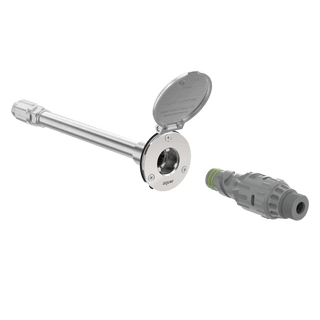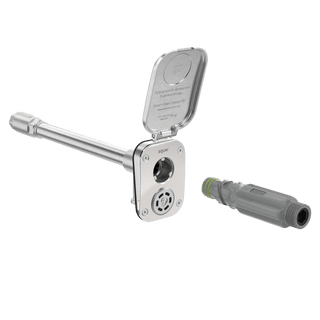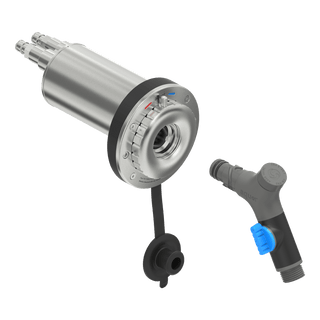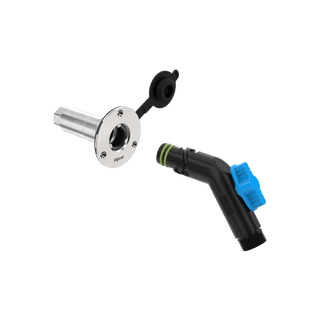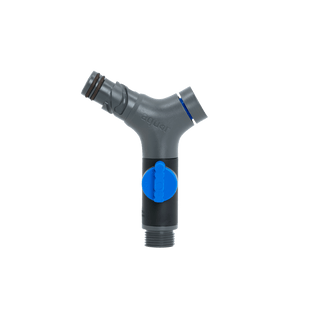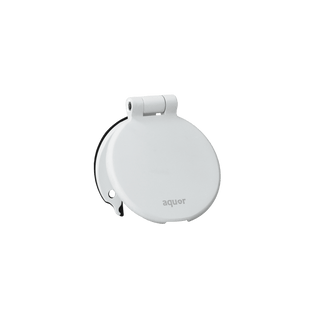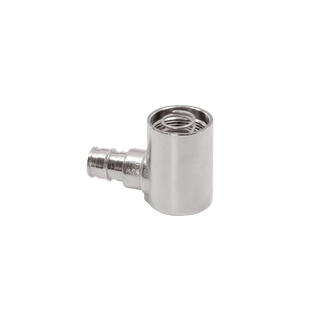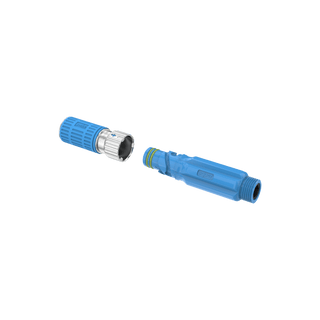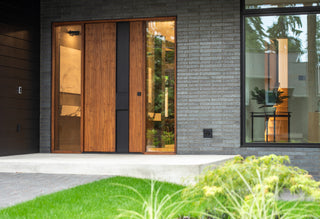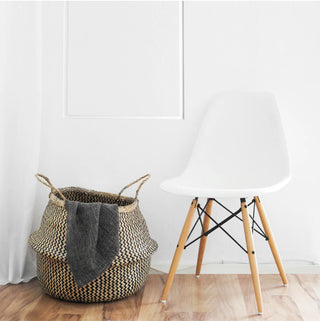Hard Water and Hose Bibs: Brass vs. Stainless Steel

What is hard water and how does it affect metal?
Hard water is water with a high amount of dissolved minerals, primarily calcium and magnesium. Water hardness simply refers to the level of minerals in the water—85% of U.S. homes have some degree of water hardness. Although the minerals are dissolved in the water, there’s a chance you may have noticed these minerals before. “Soap scum,” which is just mineral residue, is a common result of hard water interacting with soap. The white spots often found on washed dishes are also hard water residue.

Hard water is usually harmless, but not all surfaces react the same when hard water is concerned. Metals, specifically metals used in plumbing, are prone to mineral buildup and corrosion. If your home is not equipped to handle hard water, it can eat away at pipes and plumbing fixtures over time, while mineral buildup can negatively impact water flow.
Brass and stainless steel are two of the most common materials used for plumbing fixtures. In this article, we will dive into how each of these materials interacts with hard water, and why it’s important to choose the right metal if your home is supplied with hard water.

Brass
Brass is a metal alloy composed of copper and zinc. Brass, like many other alloys, has different grades depending on the amounts of copper and zinc. Each of these grades makes brass ideal for a variety of applications.
One of the most common types of brass used in plumbing fixtures is known as “red brass,” which is 85% copper. The remaining 15% includes various levels of zinc, tin, and/or lead. Red brass is used for plumbing fixtures like hose bibs because it resists corrosion better than other brass alloys.

That being said, over time hard water can potentially eat through the protective coating and corrode brass fixtures. Mineral deposits may reduce water flow as well as damage the washers and seals in hose bibs and other brass fixtures.
Stainless steel
Stainless steel is a metal alloy composed primarily of iron along with a few other elements. At least 11% of its composition must be chromium as well. Much like brass, stainless steel has various grades which offer different benefits depending on the application.
The two most common grades of stainless steel used in plumbing fixtures are 304 and 316. 304 stainless steel is most commonly used in general construction. 316 grade, often referred to as marine grade stainless steel, is primarily used for marine applications. Currently, Aquor Water Systems is the only plumbing manufacturer producing residential hose bibs using marine grade stainless steel.

Stainless steel, specifically marine grade stainless steel, is one of the best metals to use in harsh water-related environments due to its robust corrosion resistance. Although stainless steel won’t corrode like brass, it’s still important to watch out for mineral deposits over a long period of time.
Brass vs. stainless steel
Both brass and stainless steel are great materials to use with hard water, although each situation is different. Each material has its pros and cons, which we will cover below.
Brass is generally cheaper to buy and replace. Depending on your personal taste, you may prefer the look of brass over stainless steel. Brass hose bibs are the most common, so replacement parts are readily available in the vast majority of home appliance stores.
However, stainless steel is far more durable than brass, and marine grade stainless steel has superior corrosion resistance as well as freeze resistance.
Stainless steel tends to be pricier than brass initially, but Aquor's limited lifetime warranty makes the higher upfront cost a worthwhile long-term investment.

If you’re simply looking for a cheaper plumbing fixture then brass is the way to go. If you’re concerned about longevity and performance over time, then we recommend going with stainless steel.
How to combat hard water
The best way to combat hard water is to focus on the point where water is entering your home’s plumbing. Installing a water softener is the most common and effective way to do so. Water softeners filter out minerals to “soften” the water. If your area has high water hardness then we recommend contacting an experienced plumber to install a water softener for you.
If you’re seeing hard water residue or stain buildup on fixtures, vinegar serves as a great cleaning solution to help remove those blemishes and keep your fixtures looking nice and clean.
A brief summary
-
Hard water refers to water containing dissolved minerals, which can negatively impact your plumbing fixtures.
-
Brass and stainless steel are the two most common metals used for applications involving water. Specific grades of both metal alloys can combat the negative effects of hard water fairly well.
-
When choosing which metal to go with for your fixtures, take into consideration what matters to you most. If you’re concerned about the initial cost, go with brass. If you’re concerned about longevity, go with stainless steel.

Read more
Learn what makes stainless steel hydrants so great.
What is water pressure and why is it so important?

